Swarovski NL Pure 10x42 Binoculars
|
|
Review Highlights
- Unsurpassed sharp, clear image quality
- 6.6-foot minimum close focus
- 399-foot field of view at 1000 yards
- Addictive ergonomics and feel
- Unique forehead brace for a steadier view
|
Swarovski launched their NL Pure binocular line in September of 2020, so yes, we are a bit late getting to this party. But this party is still going full swing! It
is probably fair to say that Swarovski is the most innovative major optics company going these days. Between the modular scope concept, the forehead brace, and unusual
shape of the ocular tubes on these NL Pure binoculars, new and clever ideas just keep coming out of this Austrian optics giant. Swarovski released the NL Pure line a
good decade after the EL Swarovisions, so this is Swarovski’s first major binocular release in quite a while. We are here to tell you that it was definitely worth the
wait! This review was written after field testing with a 10x42 model, but we will provide the relevant details on the other models where feasible. The full line of NL Pure
binoculars includes 8x32, 10x32, 8x42, 10x42 and 12x42 configurations. For ease of reference, we will refer to the NL Pure binoculars as “NLs” from here on out, and when
we say ELs, we mean the Swarovisions only.
Optical Properties and Focusing
Optically, this is one of the most breath-taking binoculars we’ve ever worked with. The light throughput on them is 91%; that’s the percentage of light hitting the objective
lenses that gets through to your eyes. Generally speaking, anything over 90% is excellent. Even in low light, the images are crisp and detailed. Whether out on a boat at sea
where everything seems a bit grayer, or on a misty, drizzly day, the view through the NLs is rich in detail and incredibly sharp. We’ve looked through a lot of high-end
binoculars, and these NLs just jump right into that upper echelon of the very finest. We found the images to be very high contrast without detectable color bias, and largely
free of any kind of color aberration. There are two major differences between the ELs and the NLs: 1) the NLs have much better ergonomics (see below), and 2) there are some
major performance differences that require more explanation. First, the NL Pures are quicker responding in terms of focusing. The NLs go from minimum close focus to infinity
in about 2 turns of the focus knob. This is considerably faster than the ELs, which did so in about 2.5 turns. When we first heard about it, we thought that we would still
find the focusing to be somewhat slow, but in actual field use, we never experienced that! We had no trouble bringing anything into sharp view, even when given only split
seconds to do so. Second, the NLs have a much larger field of view. More on that later.
Swarovski retained several features from the ELs that were revolutionary, and in most cases the effect is as good or better than the ELs were. The fluoride-containing HD
glass and coatings remain the same. Since these were already about as good as any in the industry, they are just as excellent in the NLs. Similarly, the NLs also have a
version of the field flattener lenses that were pioneered in the ELs, and if anything, that is slightly improved over what we saw in the ELs. With the NLs, we never
experienced that “rolling ball” effect that could be disconcerting at first with the Swarovisions. This may be, in part, due to the larger field of view of the NLs.
So let’s put that detail in perspective: the 10x42 NLs have a 399-foot field of view at 1000 yards, which exceeds the field of view of many 8x42 binoculars. It’s worth
noting that the 8x42 NLs are even more impressive with a 477-foot field of view at 1000 yards! That’s a 16% increase in field-of-view over the ELs. We’ve previously noted
that people often overrate the importance of field of view, and it gets talked about simply because it’s a number that offers direct comparison between brands and models.
On the one hand, that’s still true, but on the other hand, more field of view is better, and it’s a nice thing to have, particular in wide open vistas such as during a
pelagic trip. Since we’re covering optical properties, we note that the minimum close focus on both the 8x42 and 10x42 the NLs is a nice tight 6.6 feet without significant
field collapse (that tendency for part of the field to black out). There are binoculars with shorter minimum close focus stats, but they don’t have the optical quality of
these NLs, and honestly, you don’t actually need anything closer than this. Depth-of-field is perhaps one weakness of the NLs, but again, it’s one of those properties that
tends to get overrated. Given how easily these binoculars focus, depth-of-field just doesn’t matter. Lastly, the eye relief on the NLs is 18 mm, which actually falls a little
short of what the ELs had at 20 mm. This trait is a bit tight for total comfort, but it is still adequate for most users.
Coatings
High-end binoculars like the NLs are all phase-coated and multi-coated. Without getting mired in the science of this, suffice it to say that these coatings work very well,
or you wouldn’t have the stunning image quality that the NLs provide. The color fidelity is wonderful; we detected no color bias under any field testing conditions. We
especially like the coating that increases the rate at which the binocular sheds water and helps to keep debris from adhering to the lenses, which also facilitates cleaning them.
Physical Properties and Ergonomics
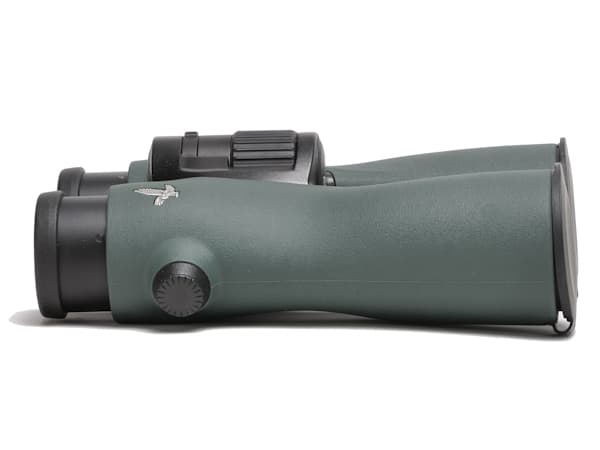 The NLs are roof-prism binoculars, but they don’t share the classic double-bridge design of the ELs. Swarovski made major design changes to the chassis. Instead of round ocular
tubes, Swarovski gave the NLs tubes that are vertically flattened at the point where the hands naturally fall, such that in a cross-sectional view, the tubes would be shaped
like an oval on its side. The NLs have the same “skin” that the ELs had, and it’s one of the best in the business! The rubber armoring has this wonderful, textured, no-slip grip
that is positively seductive in the hands. When you combine that with the flattened ocular tubes, this binocular practically begs to be held. Even when damp (we tested them in d
rizzle and fog!) these binoculars never slip from your hands. All NL models come coated in the traditional Swarovski forest green armoring, but the 32-mm models are also available
in an attractive burnt orange color. With the eyecups fully extended, the NLs measure almost exactly 7 inches (17.8 cm) long by 5.13 inches (13.0 cm) wide with the bridge fully
extended. The 10x42 NLs weigh 30.0 oz (850.5 gm). The 8x42 NL model is slightly lighter at 29.5 oz (836.3 gm)
The NLs are roof-prism binoculars, but they don’t share the classic double-bridge design of the ELs. Swarovski made major design changes to the chassis. Instead of round ocular
tubes, Swarovski gave the NLs tubes that are vertically flattened at the point where the hands naturally fall, such that in a cross-sectional view, the tubes would be shaped
like an oval on its side. The NLs have the same “skin” that the ELs had, and it’s one of the best in the business! The rubber armoring has this wonderful, textured, no-slip grip
that is positively seductive in the hands. When you combine that with the flattened ocular tubes, this binocular practically begs to be held. Even when damp (we tested them in d
rizzle and fog!) these binoculars never slip from your hands. All NL models come coated in the traditional Swarovski forest green armoring, but the 32-mm models are also available
in an attractive burnt orange color. With the eyecups fully extended, the NLs measure almost exactly 7 inches (17.8 cm) long by 5.13 inches (13.0 cm) wide with the bridge fully
extended. The 10x42 NLs weigh 30.0 oz (850.5 gm). The 8x42 NL model is slightly lighter at 29.5 oz (836.3 gm)
Part of the improvement in the NL ergonomics comes from how Swarovski changed the relative position and mechanism of the focus knob. It is now shifted further down toward the
objective lenses, so it better falls under the index fingers, which reduces finger strain. It seems like a minor thing, but we can tell you, after a good 8-10 hours in the field
with these NLs, your hands will really appreciate that difference! Focusing is wonderfully smooth and it seems to have just the right resistance to it. As a result, targets just
snap into sharpness effortlessly. Given that 30.0 oz is actually fairly heavy for a 10x42 binocular, it is worth noting that the NLs simply don’t feel that heavy in the hands.
The balance of these binoculars is superb, and the balance point falls exactly where the thumbs are supporting the weight. As a result, you just don’t notice that weight.
The interpupillary distance range on the NLs is 56-74 mm. That’s fairly average for this trait, meaning you can comfortably use these binoculars unless you have an unusually wide
or narrow face. Naturally, the NLs are sealed and nitrogen-purged to be dust-proof, internally fog-proof and watertight to a significant depth. In fact, Swarovski actually recommends
that you dunk them in water to clean them periodically, so they are pretty confident of how watertight they are!
User Adjustments
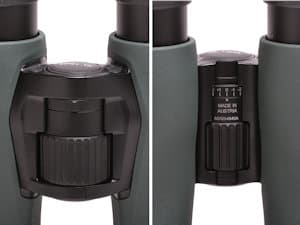 The ELs had a diopter adjustment knob that was located under the focus knob; you had to pull the focus knob up to reveal the diopter knob. Major re-design of the NL focusing
yielded a diopter adjustment slider with a raised point on it, located on top of the bridge. The slider has a good deal of resistance so it stays where you put it, and it
provides +/-4 diopters of adjustment. There is a diopter meter on the back side of the bridge to show you where it stands. It is easy and intuitive to adjust. The eyecups are
another important user adjustment. The NL eyecup system features 7 different positions including fully in and fully out, each with a solid detent to mark it. This means that
anyone can find a position that is comfortable and functional for themselves to use. Most importantly, we didn’t experience any spontaneous shifting of eyecups during field use.
The ELs had a diopter adjustment knob that was located under the focus knob; you had to pull the focus knob up to reveal the diopter knob. Major re-design of the NL focusing
yielded a diopter adjustment slider with a raised point on it, located on top of the bridge. The slider has a good deal of resistance so it stays where you put it, and it
provides +/-4 diopters of adjustment. There is a diopter meter on the back side of the bridge to show you where it stands. It is easy and intuitive to adjust. The eyecups are
another important user adjustment. The NL eyecup system features 7 different positions including fully in and fully out, each with a solid detent to mark it. This means that
anyone can find a position that is comfortable and functional for themselves to use. Most importantly, we didn’t experience any spontaneous shifting of eyecups during field use.
Covers, Case and Peripherals
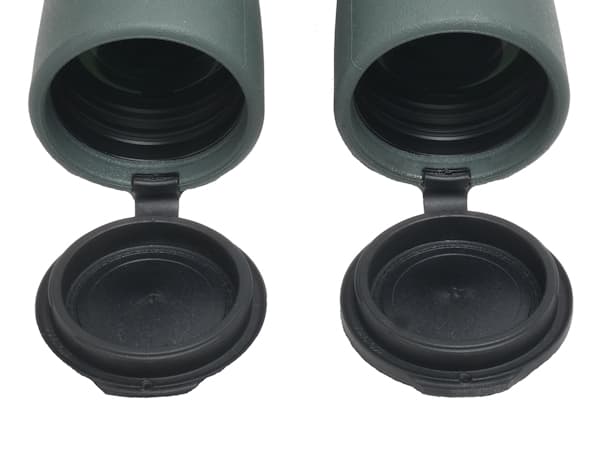 Other features of note are the lens caps, covers and case. The objective lens covers are soft rubber caps tethered to slots in the armoring itself. They are removable and easily
replaced if lost. The caps are heavy enough and the tethers pliable enough that they always dangle down out of the way. We found that occasionally, they closed inadvertently as
the binocular bounced against the chest, but this happened very rarely and wasn’t troubling. The ocular lens caps (a.k.a. rainguard) are of rubber that is at once both stiff and
Other features of note are the lens caps, covers and case. The objective lens covers are soft rubber caps tethered to slots in the armoring itself. They are removable and easily
replaced if lost. The caps are heavy enough and the tethers pliable enough that they always dangle down out of the way. We found that occasionally, they closed inadvertently as
the binocular bounced against the chest, but this happened very rarely and wasn’t troubling. The ocular lens caps (a.k.a. rainguard) are of rubber that is at once both stiff and
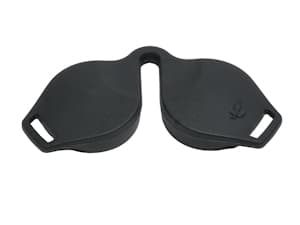 pliable. They fit quite snugly over the rims of the eyecups, and once in place, they simply don’t dislodge accidentally. You can attach them to the straps so they are always
tethered to the binocular or leave them loose and carry them with you. It would be hard to imagine anything better here. The case was re-imagined for the NLs, and it’s a neat
and practical design. The thickly padded case has a long strap and is intended to be worn beneath one arm with the strap looping around the neck over the opposite shoulder.
It is big enough to easily accommodate the binocular in a horizontal position, and it zips shut ¾ of the way around. The case has a two-zipper system. There are little flaps
pliable. They fit quite snugly over the rims of the eyecups, and once in place, they simply don’t dislodge accidentally. You can attach them to the straps so they are always
tethered to the binocular or leave them loose and carry them with you. It would be hard to imagine anything better here. The case was re-imagined for the NLs, and it’s a neat
and practical design. The thickly padded case has a long strap and is intended to be worn beneath one arm with the strap looping around the neck over the opposite shoulder.
It is big enough to easily accommodate the binocular in a horizontal position, and it zips shut ¾ of the way around. The case has a two-zipper system. There are little flaps
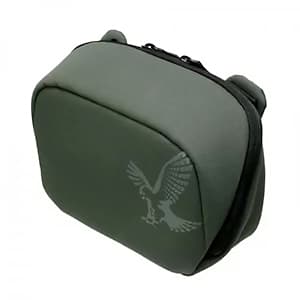 attached to the two halves of the case, which prevent it from flopping open when unzipped, so the binocular can’t fall out. Inside the case is a pouch that Velcros shut, for
storing a binocular cloth or other cleaning device. This is a really great case!
attached to the two halves of the case, which prevent it from flopping open when unzipped, so the binocular can’t fall out. Inside the case is a pouch that Velcros shut, for
storing a binocular cloth or other cleaning device. This is a really great case!
The neck strap is the usual hybrid of cordura, foam rubber and plastic parts, but that’s where the similarity to a conventional binocular strap ends. Swarovski redesigned their
neck strap from the ELs. One of the great features of their strap is how easy it is to adjust the strap length. This is really well designed. A couple other things come with the
binocular, including a little soap and soft brush set and an optic cloth, both for cleaning it. We still recommend getting a lens pen to assist in cleaning any binocular. Using the
lens pen to remove grit before you rub the lens with anything will help preserve those coatings that are so critical in providing the great image quality of the NLs.
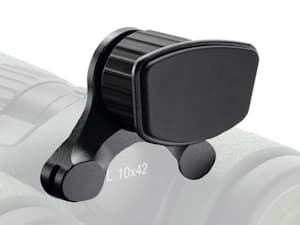 Swarovski also sells two optional peripherals that we really like: the Bino Suspender Pro harness, and the forehead rest. The harness is like any harness strap, though we found it
to be a particularly well-designed and functional harness, as these things go. It never seemed to require adjusting, so you just didn’t notice it in the field. The forehead rest is
another bit of brilliant innovation. Swarovski first introduced this concept with the BTX scope binocular eyepiece, but this is the first time they’ve put it on a binocular. It is a
little soft rubber piece on a curved plastic frame, that sits on top of the bridge. A little knob adjusts the extent to which the brace protrudes upward from the bridge. The idea is
that you set it to rest firmly against your forehead, thus providing a third stabilizing point for the binocular, beyond just your hands. We found it to be remarkably effective. During
a pelagic trip, this brace allowed us to hold the binocular steady with just one hand, leaving the other hand free for that all-important grip on the railing. The alternative would be
to go to an image-stabilized binocular, if you have a serious need for a more stable view. We have one small objection with the mechanism: the brace seems to slip a bit so that it doesn’t
stay the proper distance from your forehead. The adjustment knob has lots of little detents in it, in an attempt to prevent that, but it seemed to always be collapsing a bit when you weren’t
paying attention to it. Maybe a locking mechanism or more stable detents would improve this otherwise excellent feature. Another optional peripheral is the winged eyecups. These are eyecups
that feature a pliable rubber extension that goes back around the outside of the eye, to better block out stray light. It’s a nice feature if, for whatever reason, you are particularly
bothered by stray light from the side. Since use of these eyecups would mean that the rainguard doesn’t fit anymore, Swarovski also provides a replacement rainguard that does fit snugly
over the “winged” eyecups when you purchase this peripheral.
Swarovski also sells two optional peripherals that we really like: the Bino Suspender Pro harness, and the forehead rest. The harness is like any harness strap, though we found it
to be a particularly well-designed and functional harness, as these things go. It never seemed to require adjusting, so you just didn’t notice it in the field. The forehead rest is
another bit of brilliant innovation. Swarovski first introduced this concept with the BTX scope binocular eyepiece, but this is the first time they’ve put it on a binocular. It is a
little soft rubber piece on a curved plastic frame, that sits on top of the bridge. A little knob adjusts the extent to which the brace protrudes upward from the bridge. The idea is
that you set it to rest firmly against your forehead, thus providing a third stabilizing point for the binocular, beyond just your hands. We found it to be remarkably effective. During
a pelagic trip, this brace allowed us to hold the binocular steady with just one hand, leaving the other hand free for that all-important grip on the railing. The alternative would be
to go to an image-stabilized binocular, if you have a serious need for a more stable view. We have one small objection with the mechanism: the brace seems to slip a bit so that it doesn’t
stay the proper distance from your forehead. The adjustment knob has lots of little detents in it, in an attempt to prevent that, but it seemed to always be collapsing a bit when you weren’t
paying attention to it. Maybe a locking mechanism or more stable detents would improve this otherwise excellent feature. Another optional peripheral is the winged eyecups. These are eyecups
that feature a pliable rubber extension that goes back around the outside of the eye, to better block out stray light. It’s a nice feature if, for whatever reason, you are particularly
bothered by stray light from the side. Since use of these eyecups would mean that the rainguard doesn’t fit anymore, Swarovski also provides a replacement rainguard that does fit snugly
over the “winged” eyecups when you purchase this peripheral.
Conclusions
The Swarovski NL Pure binoculars offer simply amazing optical performance for unsurpassed image richness and sharpness. The view is so good it’s practically intoxicating. And the ergonomics of
these binoculars is among the best we’ve ever seen.
The table below shows the MSRP and Optics4Birding price of all NL Pure models.
|
Model
|
Suggested Retail Price
|
Optics4Birding Price
|
|
8x32
|
$2,704.90
|
$2,459.00
|
|
10x32
|
$2,748.90
|
$2,499.00
|
|
8x42
|
$3,243.90
|
$2,949.00
|
|
10x42
|
$3,298.90
|
$2,999.00
|
|
12x42
|
$3,353.90
|
$3,049.00
|
Buy
Swarovski NL Pure Binoculars